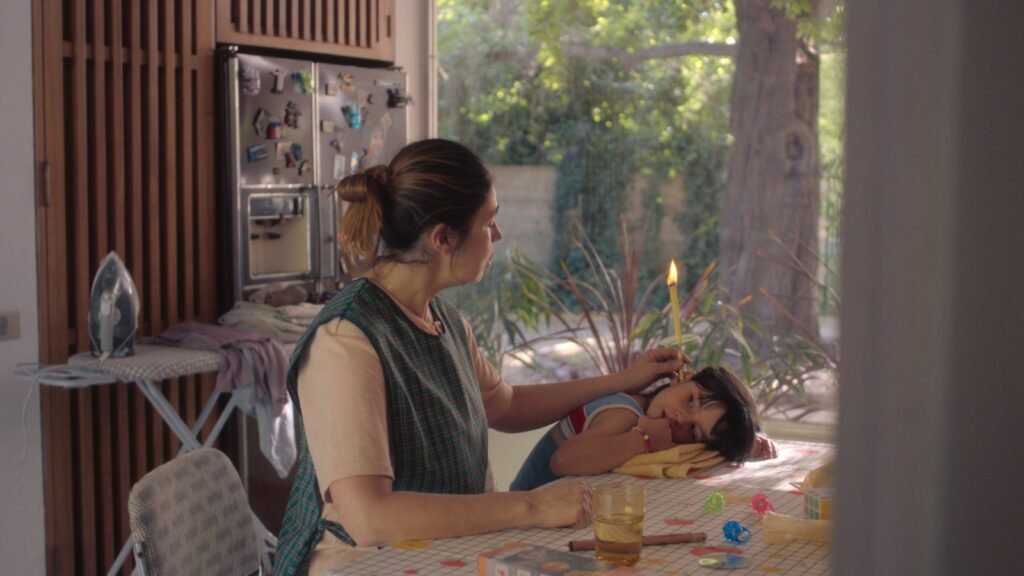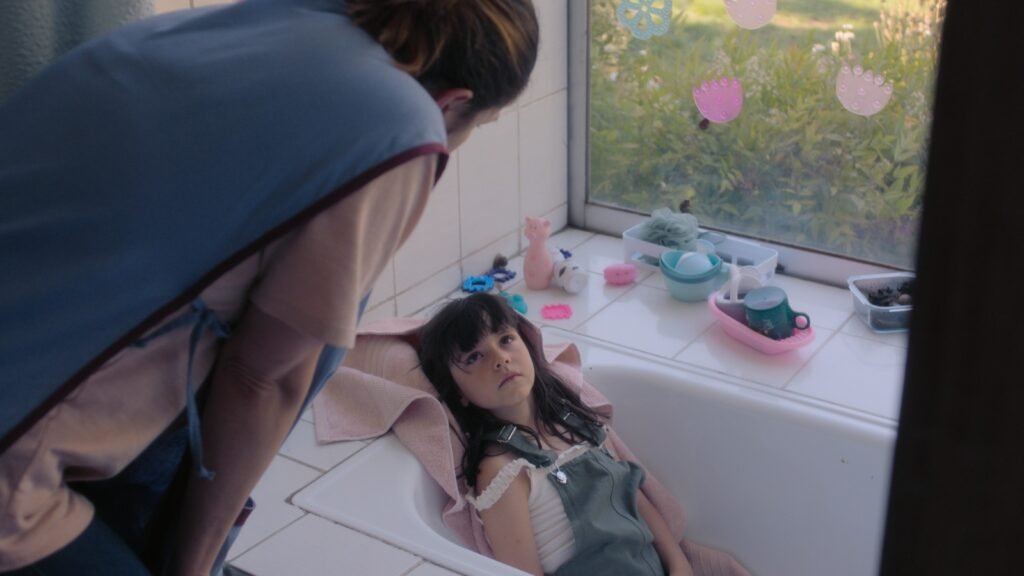Swim To Me Review

Director: Dominga Sotomayor
Date Created: 2025-10-10 22:34
4
Swim To Me Review: Directed by Dominga Sotomayor, Limpia is a Chilean film based on Alia Trabucco Zerán’s lauded novel. It is led by María Paz Grandjean as Estela, a woman who leaves rural life to take a job as a live-in housekeeper for a wealthy family in Santiago. With her are Rosa Puga Vittini as Julia, the young girl who becomes friends with Estela, and supporting work from Ignacia Baeza, Benjamin Westfall and Rodrigo Palacios.
Swim To Me Review
Netflix’s Swim To Me follows Estela, a quiet workhorse of a woman who suddenly finds herself in this new world of marble floors, swimming pools and unspoken rules. She takes a job caring for the 6-year-old Julia, the daughter of two wealthy but neglectful parents. And over time, Estela is not just a nanny — she’s the child’s emotional grounding, her warm centre in a home that seems cold and removed.
But underneath this bond hovers an imbalance that keeps getting heavier with each scene. Estela is a member of a class that is called to serve in ways that remove her from time and family, and freedom. Her wealthy employers, Mara and Cristobal, demand she always be at the ready (when her own mother becomes sick, as well). The warmth she extends to Julia is on loan from her own life, and the muted tragedy of that reality is what makes Swim To Me stick with you so hauntingly.

The movie doesn’t scream its emotions; it allows them to breathe in long silences, tender eyes and unspoken anguish. There are moments when nothing is spoken and yet everything is felt — a hand lingering on a door frame, a child’s eyes looking for reassurance, the gaze of a woman staring at an unringing phone.
I loved that nuance of the film. It doesn’t play on your heart to bring you to tears. Instead, it’s slow and builds an emotional truth that ends up landing much harder by the conclusion. There are long, loving shots of water, swimming pools and rain, reflections on its rippling surfaces that suggest the director wants to show us how emotions run and drown people in quiet ways.
Performance by María Paz Grandjean is nothing short of extraordinary. As Estela, she underplays everything, no great meltdowns, no attention-grabbing monologues, just a woman gradually falling apart under the weight of her hidden pain. She is tired, and we can feel that she is tired, just as we can also sense that she is strong.

Rosa Puga Vittini, as Julia, provides one of those rare child performances that is natural and touching. The love between her and Estela rings true, which only darkens the film’s gut-wrenching finale. It’s not traditional mother-daughter chemistry at all, but rather something more fragile, two lonely souls fumbling to find solace with one another.
The secondary characters, in particular Ignacia Baeza and Rodrigo Palacios as Julia’s parents, embody the indifference of privilege perfectly. Their distance and coldness are a reminder that emotional neglect can be present even in the mansion.
I don’t want to reveal spoilers, but I will say this: the movie Swim To Me ends in a tragic way that surprised and saddened me. It’s not just about death or loss — it’s really about guilt, and love, and how the hierarchies of society can dismantle even the most innocent connections.

Estela’s realisation that she should have put herself and her family before work sooner comes too late. By the time she grasps how thoroughly she’s been used, it’s too late. The second time the door was locked, and a baby died — Julia’s destiny through neglect reflects itself in that other child who loved too much, in a home too open to bear her passions.
It’s a quiet, not graphic ending. It’s silent, as is everything else in the film. But it sticks after the credits roll, and you’re left to question what empathy really means in a world where love is so often conditional.
One of the many things I liked about Netflix’s Swim To Me is how it discusses class and dignity and emotional labour without ever getting preachy. It doesn’t portray the rich as monsters or the poor as saints. Rather, it demonstrates the ways that loneliness can affect both sides, just differently manifested.
Estela’s employers mask their culpability with work and wealth. Estela buries herself behind duty and silence. Each is ensnared, and one of them has the power to walk away. It is that lopsidedness — more than anything else, I think — which is at the emotional heart of the film.

I also thought the film’s commentary on “invisible care work” was incredibly germane. Whichever country is concerned, Chilean women such as Estela are those who pen their own lives in order that others may live in comfort and well-being.” The film does not romanticise her suffering; it merely reflects it, and that is what makes it so powerful.
Netflix Swim To Me Review: Summing Up
I quite enjoyed Swim To Me for its honesty and sensitivity. It’s not an easy watch, but it sticks with you. It may be slow-paced for some, but I believe that’s why it works; it affords you the time to linger with the discomfit, feel the stillness that these characters live in every day. There were times, as I watched the film toward its end, that I found myself wanting for Estela some measure of peace, but perhaps the movie’s power lies exactly in how it declines to offer any such thing. Life rarely gives closure, and it’s a fact beautifully reflected in the movie.

First of all this is not a wealthy chilean family but more a middle class chilean family.From which country are you coming from? Perhaps in Irak or Africa this may seems wealthy but here in Chili not !!
Come on. A doctor living in Vitacura/Lo Barnechea is not “middle class”😂